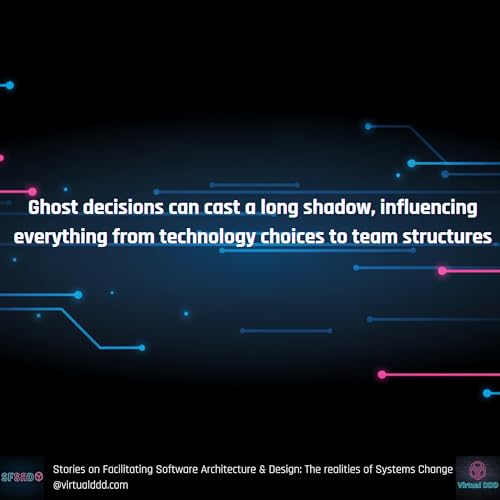
Uncovering the Ghost Decisions in Your Architecture
Failed to add items
Sorry, we are unable to add the item because your shopping cart is already at capacity.
Add to basket failed.
Please try again later
Add to Wish List failed.
Please try again later
Remove from Wish List failed.
Please try again later
Follow podcast failed
Unfollow podcast failed
-
Narrated by:
-
By:
About this listen
In this episode, Andrew Harmel-Law, joined by Andrea Magnorsky and Kenny (Baas) Schwegler, discusses "ghost decisions," which are fundamental architectural choices that are often undocumented, implicit, or even forgotten. These decisions can cast a long shadow, influencing everything from technology choices to team structures.
Key Takeaways- Implicit Decisions: Andrew shares his experience with projects where he found that the most fundamental architectural decisions had already been made, often implicitly or as a result of legacy choices. These are often not explicitly architectural decisions, but rather things like the product being built or the team structure, which have a significant architectural impact.
- Reverse-Engineering ADRs: To address these "ghost decisions," one team Andrew worked with began reverse-engineering Architecture Decision Records (ADRs). They documented historical decisions, including the three different options they selected and the reasons why they were rejected at the time. This provided clarity on the original constraints and allowed the team to revisit decisions when the context had changed, such as a startup growing into a large scale-up.
- Documenting Disagreements: The episode also touches on the challenge of documenting the human factors behind decisions, such as conflicts and power imbalances. Andrew suggests using phrases like "
- adopted despite" or "rejected despite" in ADRs to acknowledge opposing viewpoints and ensure all perspectives are represented in the official documentation. This approach can help people feel acknowledged and provides valuable context for new team members.
- The "Telephone Game": Kenny highlights the dangers of relying on undocumented decisions, which can lead to a "telephone game" where information is distorted or lost as people join and leave the team. Without a clear record, it becomes difficult to understand why certain choices were made, making it harder to evolve the codebase.
No reviews yet
In the spirit of reconciliation, Audible acknowledges the Traditional Custodians of country throughout Australia and their connections to land, sea and community. We pay our respect to their elders past and present and extend that respect to all Aboriginal and Torres Strait Islander peoples today.



